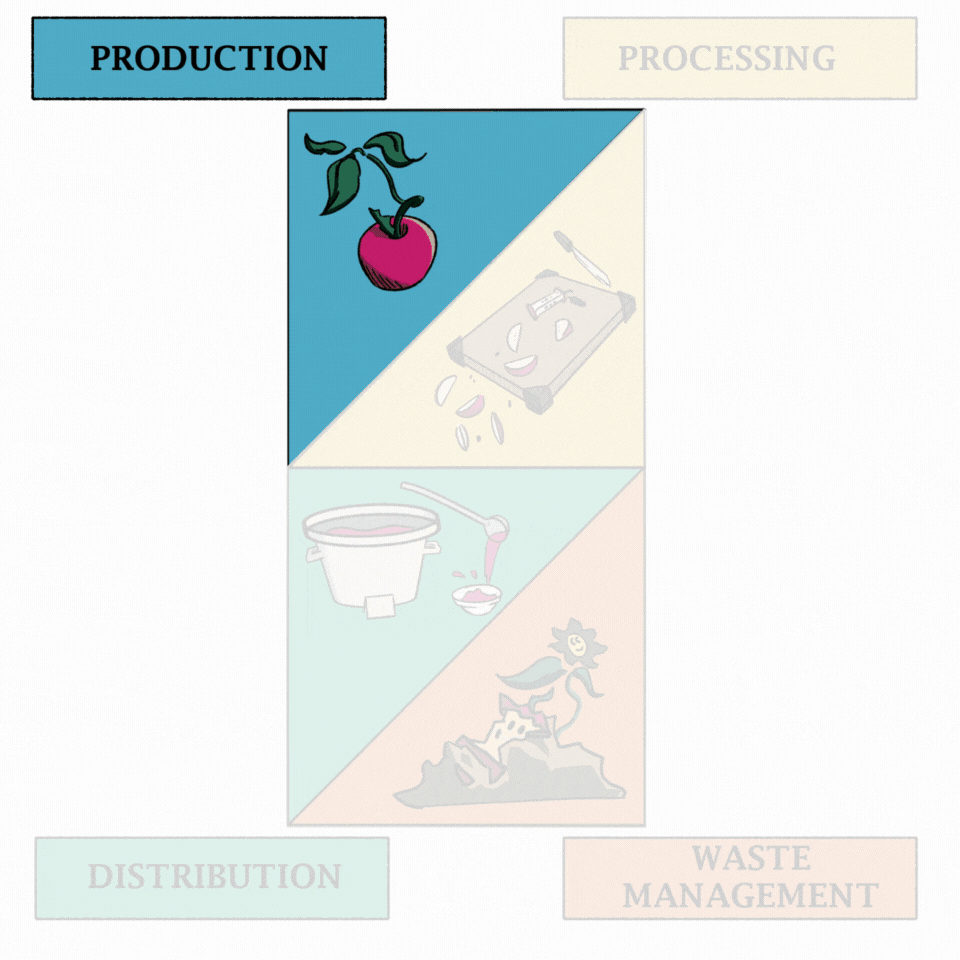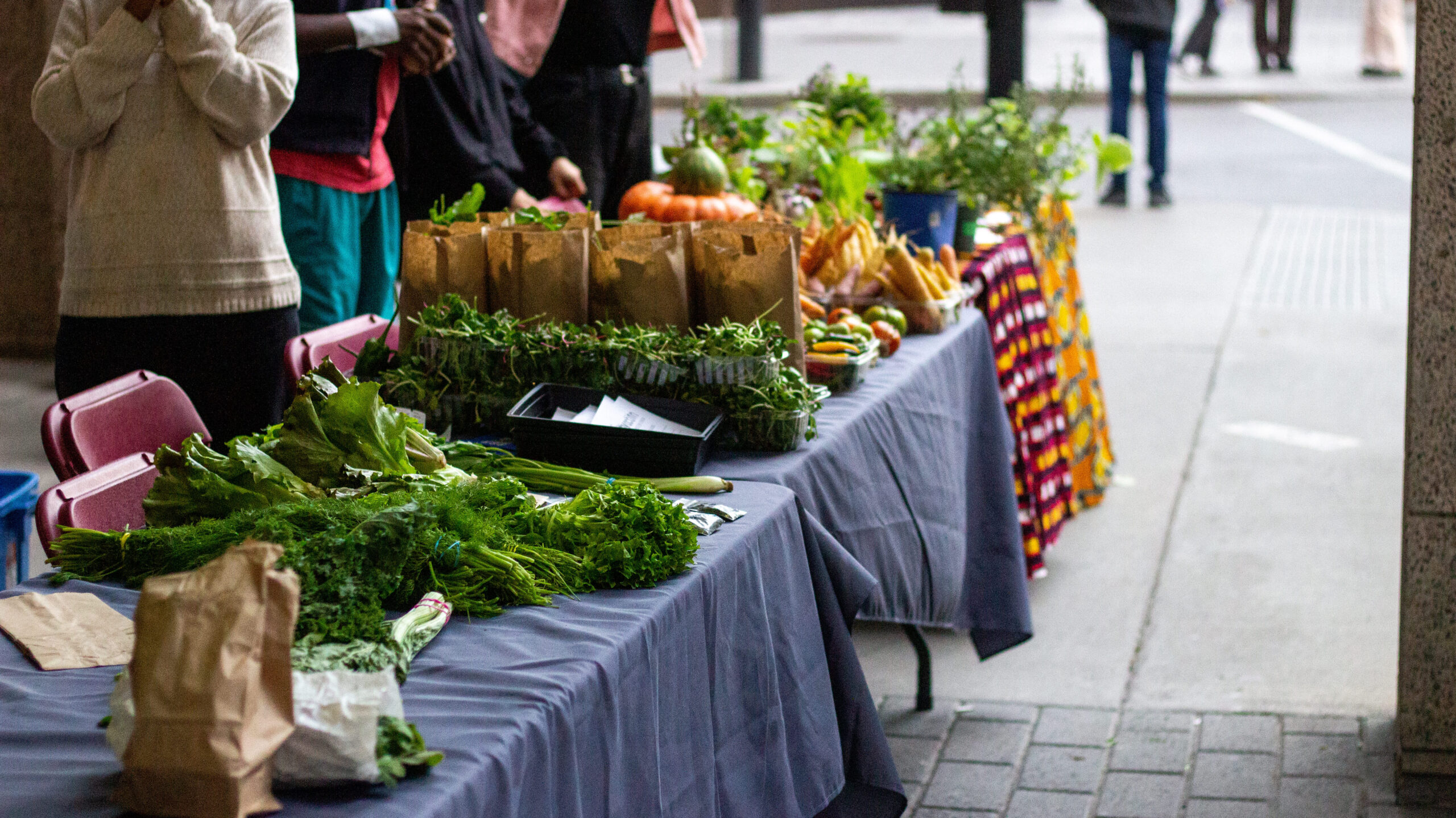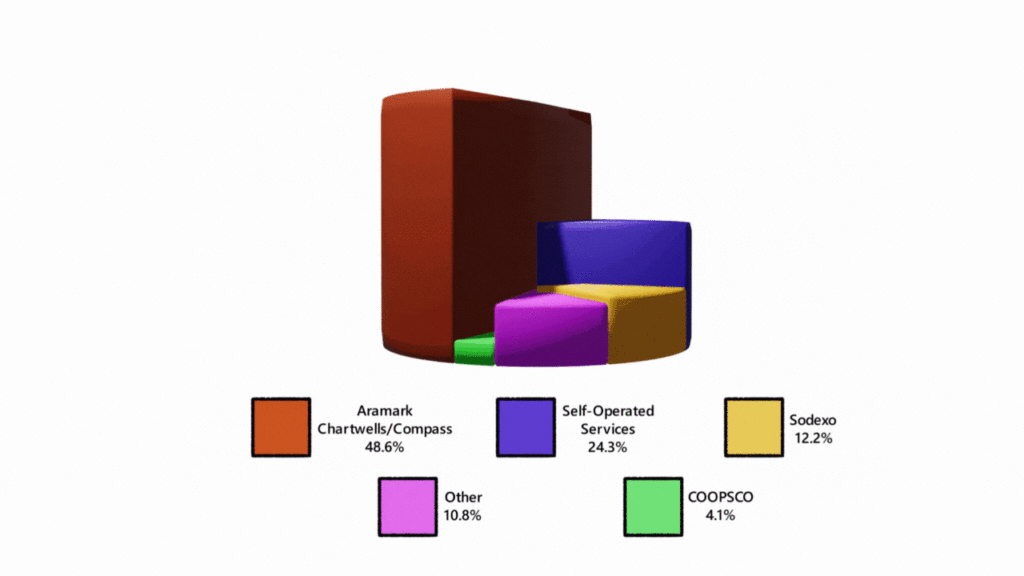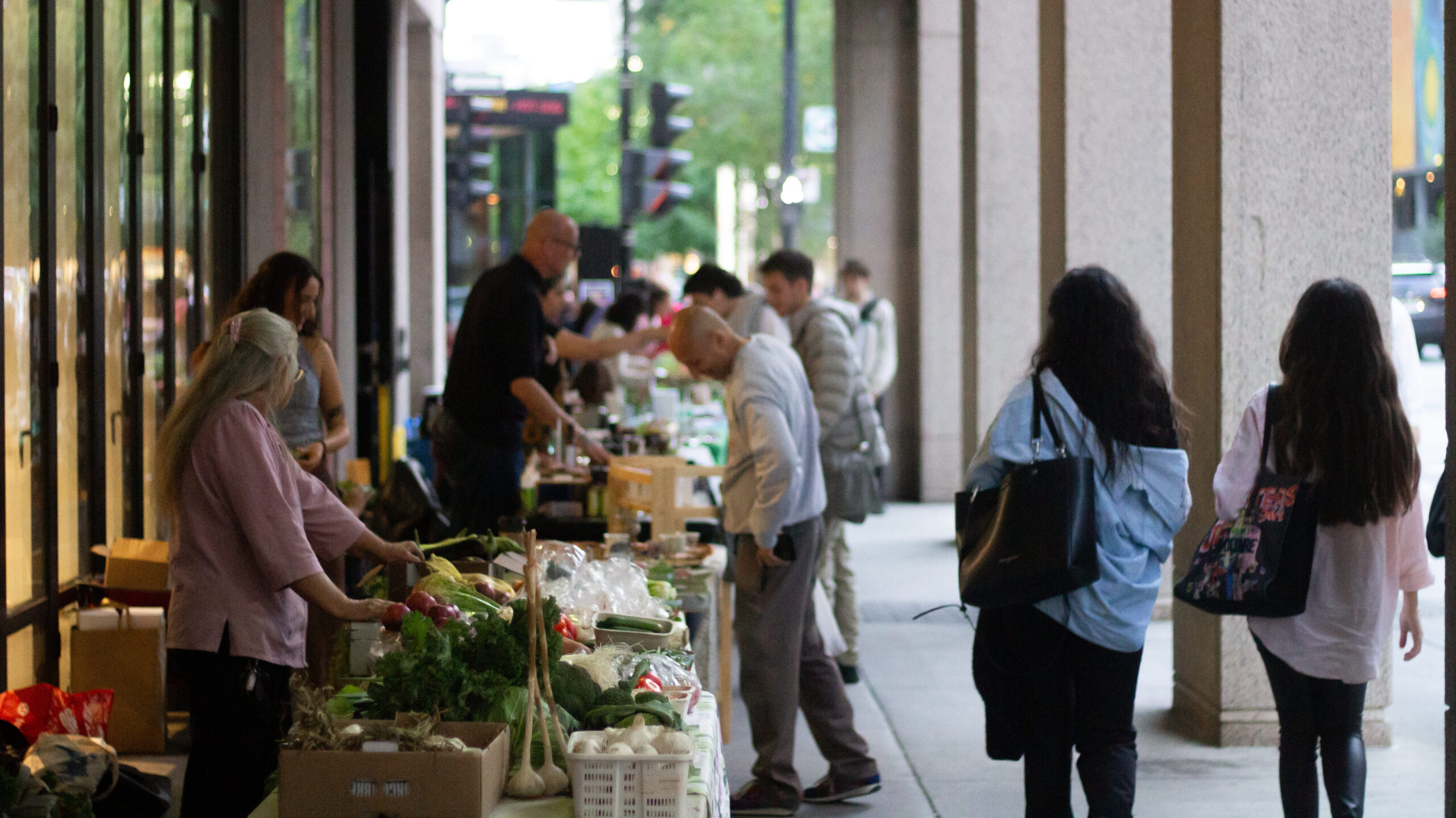Following Concordia’s New Contract With Aramark, The Fight Is Still Not Over For A Food-Sovereign Campus
In April, Concordia’s board of governors signed a new contract with multinational food services corporation Aramark to return as the University’s food supplier until May of 2026, with the possibility of a two-year extension. Aramark has been notorious for its ties to the US prison system ,and offering poor working conditions.
The University’s decision to sign a new contract with the corporation goes against a continual effort to steer Concordia away from multinational corporations and towards social enterprises or not-for-profit food suppliers instead, in an attempt to make Concordia into a food-sovereign campus.
In 2021, it seemed as though the University was seriously considering this alternate option. “Concordia was making an effort to explore options outside of multinational corporations,” said Shylah Wolfe, executive director of the Concordia Food Coalition (CFC).
Oliver de Volpi, Concordia’s Food Services manager, corroborated this claim. “We investigated some other options. The one that was even presented by Concordia Food Coalition didn’t pan out. They weren’t ready to bid.”
Ultimately, the University did sign a new contract with Aramark. But, it’s not the end of the movement for a food sovereign campus.
Currently, the CFC is drafting a business plan for what they are calling the New Food Enterprise (NFE), which will be modeled largely off of Diversity Food Services (DFS), a social enterprise providing food service at the University of Winnipeg.
The CFC’s website states that “the NFE will be an environmentally, socially and economically sustainable social enterprise capable of becoming Concordia’s campus food service provider. We are building a coalition of community stakeholders and local food producers to supply affordable and sustainable food options at scale to the university.”
The NFE will bring together the Concordian Student Union, the Hive Cafe, SEIZE, and collaborate with the University’s senior administration. The CFC website states that “there is already broad understanding that the NFE is the transformative model that Concordia needs. Our job is to bring it to fruition.”
The Concordia Student Union has contributed $50,000 total to the NFE project. The CFC has taken $10,000 of the aforementioned funding to contract Chief Operating Officer of DFS Ian Vickers as a consultant. The VP Student Services Office has also pledged $25,000 to the project, Wolfe told The Concordian, with the remaining funds supporting additional planning, financing and partnership development.
“They’re putting their money where their mouth is, and taking us a bit more seriously. Now that we have four years to develop an alternative that is not just lip service, it will be an actually fleshed-out plan,” said Wolfe.
The money was pledged by the University before Aramark won the Request For Proposal (RFP) bid, with the CSU’s funding coming in during the bidding period.
Since 2020, and during the RFP period, the CFC and other student representative groups sitting on the Concordia Food Advisory Working Group (FAWG) advocated for Concordia to adopt a model similar to that of Diversity Food Services. This would include cooking from scratch, more involvement in local food economies, and providing better benefits for staff.
“What we’re doing now is essentially taking a provenly successful model at the University of Winnipeg with Diversity, and essentially building out an offering on a silver platter to the administration that we would run it with Diversity closely consulting,” said Wolfe.
According to Wolfe, the business would be owned by stakeholders made up of the University, the CFC, and DFS.
According to the University’s sustainable food systems plan, Concordia and Aramark are making efforts to be more sustainable and improve upon their last contract, by bringing in more local products, removing Aramark’s rights to operating vending machines on campus, and making meals offered in cafeterias one-third vegetarian, one-third vegan and one-third meat by 2025.
De Volpi further stated that while Concordia did decide to re-sign with Aramark, the decision was not motivated purely by finances.
“75% of the criteria for coming back to campus is not financially related. It’s sustainability operations, it’s nutrition, it’s that part of it. And Aramark won the bid. They’ve made contractual obligations to be easily a leader in Canada in both sustainability and nutrition. We’re going to hold them to it as well,” he said.
But many advocating for a new food service model feel that their current goals aren’t enough.
“I think that the goals that the University has are commendable, but they’re not transformative. I think that it is difficult for them to ever do anything transformative if they continue with the bureaucratic processes that they are using,” said Wolfe.
“That last 25 percent is weighted twice as heavily as the other 75 percent,” explained de Volpi.
Erik Chevrier, a part-time professor at Concordia who did his PhD on building food-sovereign campuses, and a Concordia FAWG member, explained why Concordia’s sustainability goals can’t be too transformative under the current RFP model.
“If you look at the targets, they’re not too hard to meet. So the targets are somewhat written for the big food service providers to be able to meet them, because if not, they’re setting unrealistic goals. So in some way, the idea that if they make this criteria too stringent nobody could actually fit the criteria. They’ll have no food service provider,” said Chevrier.
Financial aspects are involved in the RFP process. According to Chevrier, Companies need a minimum of $5 million annual revenue in food service before being able to bid. This requirement makes it difficult for small or new food service entities to compete for a contract. This is to help ensure that the companies Concordia partners with can remain viable throughout the year, and makes it harder for smaller-scale or new companies to compete during the RFP.
“There’s a big risk for us. We bring in [a food supplier] who’s never existed before that, you know, a month in and they say we just don’t have the personnel to operate anymore. We’re going to close down. Then what do we do with 1,000 students that live here and the rest of the population that depends on us?” said de Volpi.
Wolfe feels that the risk is on the CFC and now with the ability to develop their own business plans, when the next RFP comes around in 2026, the New Food Enterprise will be able to prove their viability.
“We’re basically taking all of the risk for them, to develop this, to garner the support, the political will and also build out the actual back-end with a supply network. We’re essentially going to build them a business that will do all the things that they said they were going to do, but give them none of the risk,” said Wolfe.
Chevrier pointed out that Concordia has a number of student-built food initiatives that have been able to remain viable for many years.
“We’ve created them in the past, or students have, like the People’s Potato,” said Chevrier. “Nobody believed that it would last 20 years when it was first incarnated.”
Across Canada, Concordia has one of the strongest student-run food economies, with seven organizations operating in 2018.

These economies all work together across Concordia in a way that Aramark doesn’t.
Aramark makes half of their money off a mandatory meal plan for most students in residences. This plan provides flex dollars that can only be spent at Aramark’s other retail locations across campus. Chevrier believes that allowing flex dollars to be spent at student locations would be largely beneficial.

“First of all, it’ll create competition for the big food service providers, maybe get them to behave a little bit better. And second of all, it could actually provide a local economy, where students can actually choose where they want to go,” said Chevrier.
While DFS, the business the New Food Enterprise is based on, did struggle during its start-up phase, has now yielded a better performance for the University of Winnipeg than their previous multinational supplier, Chartwells.
“The University does better with us than they ever do with Chartwells because we sell three times what Chartwells did. People actually want to eat real, made from scratch food a lot more than they wanted to eat that processed food.” said Vickers.
The new contract with Aramark is an improvement on the last, but the problem many have with it is not Aramark themselves, but Concordia continuing to work with multinational corporations.
“There’s a lot of evidence to show that actually, the global food industry is decimating our planet. So basically, most of these big corporations, externalized costs in that they basically externalize them to people,” said Chevrier.
Concordia has a long history of working with multinational suppliers. Their relationship with Aramark began in 2015, and prior to that they worked with Compass-Chartwells and Sodexo, two other multinational food supply and hospitality corporations.
Combined across Canadian universities, these corporations make up 60.8 per cent of the food suppliers among universities in Canada, according to Erik Chevrier’s thesis on building food-sovereign campuses.
“Each of these corporations really relies on supply chains that actually drive down costs as much as they can by externalizing the environmental and social costs,” said Chevrier.
“Concordia, as an innovator, I think should actually be looking towards how we can better the world, especially in some of the industries that they’re actually partaking [in.]”
The advantage of moving away from multinational corporations and towards social enterprises like DFS is that they are able to better interact with local farmers and food producers. Currently, according to University Spokesperson Vanninia Maestracci, 43 per cent of food offered in cafeterias is local or sustainability sourced.

Vickers stated that last year, 72 per cent of food served by DFS was locally or sustainably sourced. Purchasing locally most of the time is naturally better for farmers, who have experienced a 31.5 per cent increase in total outstanding debt across Canada since 2017, according to Statistics Canada.
By working with more local food suppliers, DFS is able to better manage its supply chain and from-scratch cooking is made more possible to attain.
“Our cooks come in first thing in the morning. They bring in fresh turkeys, the first thing the chef will do is throw the turkeys in the oven instead of roasting them off so that she can slice them out and then cut it down and that becomes turkey sandwiches. She takes those bones and she puts them in a pot and starts making turkey stock. Then she can make gravy for what’s going to go on the poutine, as well as make soup,” said Vickers.
According to Vickers, the cost of bringing in local food is largely the same as well.
“We tend to be between two and three per cent less expensive,” he claimed.
Independent food suppliers have the freedom to work with as many producers as they like and don’t suffer the same turnaround times for payment as larger corporations do.
“When it’s an independent business, being able to pay farmers for cash right at the farm gates or out of their delivery truck is more possible,” said Wolfe. “We can work with as many suppliers as Diversity does, which is sometimes up to 100 different local producers.”
“Large corporations like Aramark or even the University would not be able to do that because they have like sometimes 90- to 120-day payment processing so they have to work with huge distributors,” she stated.
“Part of the reason Diversity is able to do this is because, while they are a for-profit business they are also a social enterprise,” explained Vickers.
“What would normally be the profit that you would pay to your owners, is invested instead in environmental, social, cultural, or local economic sustainability,” he continued.
“What [the University] charged myself and the rest of our management team with is taking the profit and reinvesting it into being a good player in the global economy. So what does that mean? It means that we buy as locally as possible every single time.”
Additionally, under this model Diversity Food Services is able to offer a living wage, benefits and pension plans to all of their employees.

There is a lot of money to be made in these contracts — a study by the CFC found that the food service providers who won the RFP process in 2015 stood to make a minimum of $7 million in revenue annually.
Under the new food enterprise model, any money made by the business could then be reinvested.
“The profits, if there are any, would be in the community,” said Wolfe.
“That money would be reinvested in the business so that it’s cheaper, so that meal plans and generally food is cheaper, or so that workers get more money or it would be donated to the community organizations that need funds to run their projects.”
Creating a project like DFS at Concordia is ambitious, and bringing in more local food to supply the 3,000 meals a day that CFC provides is a big task. It’s one that Vickers says will need a really solid plan, but he doesn’t think its impossible.
“Your local agriculture is so much better equipped to do this than we are,” said Vickers. “It would be incredibly feasible.”




